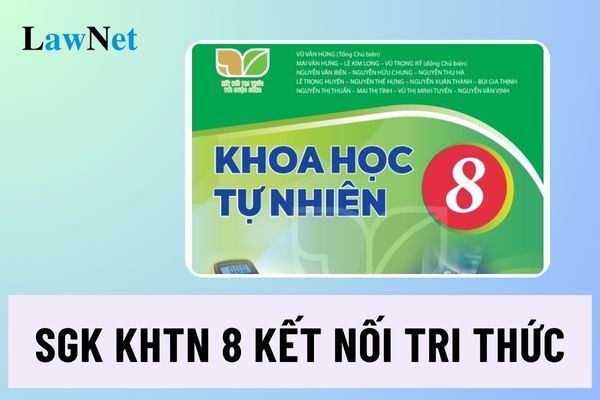What are grade 8 Natural Science textbooks of the "Ket noi tri thuc" program in Vietnam?
What are grade 8 Natural Science textbooks of the "Ket noi tri thuc" program in Vietnam?
Based on the list of Grade 8 textbooks utilized in general educational institutions attached to Decision 4606/QD-BGDDT in 2022, the regulation on the Grade 8 Natural Sciences textbook of the "Ket noi tri thuc" program is as follows:
The full name of the Grade 8 Natural Sciences textbook of the "Ket noi tri thuc" program is: Natural Sciences 8 (Connecting Knowledge to Life), published by Vietnamese Education Publishing House.
Authors: Vu Van Hung (General Editor), Mai Van Hung, Le Kim Long, Vu Trong Ry (Co-editors), Nguyen Van Bien, Nguyen Huu Chung, Nguyen Thu Ha, Le Trong Huyen, Nguyen The Hung, Nguyen Xuan Thanh, Bui Gia Thinh, Nguyen Thi Thuan, Mai Thi Tinh, Vu Thi Minh Tuyen, Nguyen Van Vinh.

What are grade 8 Natural Science textbooks of the "Ket noi tri thuc" program in Vietnam? (Image from Internet)
What requirements must grade 8 students in Vietnam meet when studying electricity in natural sciences?
Pursuant to subsection 3 of Section 5 of the Natural Sciences program attached to Circular 32/2018/TT-BGDDT, grade 8 students studying electricity in natural sciences must meet the following requirements:
| Content | Requirements |
| - Electrostatic phenomena - Electric current - Effects of electric current - Power source - Simple circuit - Measuring current and voltage |
- Explain briefly the cause of an object becoming electrostatically charged due to friction. - Explain a few practical phenomena related to electrostatic charging due to friction. - Define electric current as the directed flow of electric charge carriers. - Describe power sources capable of supplying electrical energy and list some common electric sources in daily life. - Classify conductive and non-conductive materials. - Conduct experiments to illustrate the basic effects of electric current: heat, light, chemical, physiological. - Draw circuit diagrams using symbols to describe: resistor, variable resistor, bell, ammeter, voltmeter, diode, and light-emitting diode. - Connect a simple circuit with: battery, switch, connecting wires, light bulb. - Describe briefly the uses of fuses, relays, circuit breakers, electric bells. - Conduct experiments to state that the reading of the ammeter is the value of the electric current intensity. - Conduct experiments to state that the ability of a battery (or accumulator) to generate electric current is measured by the voltage (also called electrical pressure) between its terminals. - State the units of measurement for electric current intensity and voltage. - Measure electric current intensity and voltage using practical tools. |
What are the specific manifestations of students' natural sciences competencies in Vietnam?
According to subsection 2 of Section 4 of the Natural Sciences program attached to Circular 32/2018/TT-BGDDT, the specific manifestations of students' natural sciences competencies are as follows:
| Competence Component | Manifestation |
| Scientific Knowledge Recognition | Present and explain core knowledge about the components, diversity, systematization, principles of motion, interaction, and transformation of the natural world. Specific manifestations: - Identify and name objects, phenomena, concepts, principles, and processes of nature. - Describe objects, phenomena, their roles, and natural processes in formats like spoken and written language, formulas, diagrams, charts, etc. - Compare, classify, and select natural objects, phenomena, and processes based on different criteria. - Analyze characteristics of an object, phenomenon, or natural process in a logical manner. - Identify keywords, use scientific terminology, connect information logically, and create outlines when reading and presenting scientific texts. - Explain relationships between objects and phenomena (cause-effect, structure-function, etc.). - Identify and correct mistakes; make critical judgments related to discussion topics. |
| Exploring Nature | Execute basic skills to understand and explain natural phenomena and life, proving real-world issues with scientific evidence. Specific manifestations: - Proposing Issues, Asking Questions + Identify and ask questions related to the problem. + Analyze the context to propose problems by connecting existing knowledge and experience, express proposed problems in their own language. - Making Predictions and Formulating Hypotheses + Analyze the problem to state predictions. + Build and articulate the hypothesis to be explored. - Planning the Investigation + Construct a logical framework for the investigation. + Choose suitable methods (observation, experimentation, investigation, interviews, literature review, etc.). + Develop a plan to carry out the investigation. - Executing the Plan + Collect and record data from literature reviews, experiments, and investigations. + Assess results based on simple statistical analysis of the data. + Compare results with hypotheses, explain, draw conclusions, and adjust as needed. - Writing, Presenting Reports, and Discussing + Use language, drawings, diagrams, and tables to present the investigation process and results. + Write reports after the investigation. + Collaborate with partners with a positive and respectful attitude, listen actively, and appreciate others' opinions to assimilate positively and argue, defend investigation results convincingly. - Making Decisions and Proposing Solutions + Make decisions and propose solutions to the issues researched. |
| Applying Knowledge and Skills | Use knowledge and skills in natural sciences to explain common natural phenomena and life, issues of environmental protection and sustainable development; behave appropriately and address simple problems related to themselves, family, and community. Specific manifestations: - Identify and explain practical problems based on natural sciences knowledge. - Propose and execute solutions for nature protection, adapt to climate change, behave appropriately with sustainable development requirements based on understanding and investigation data. |

